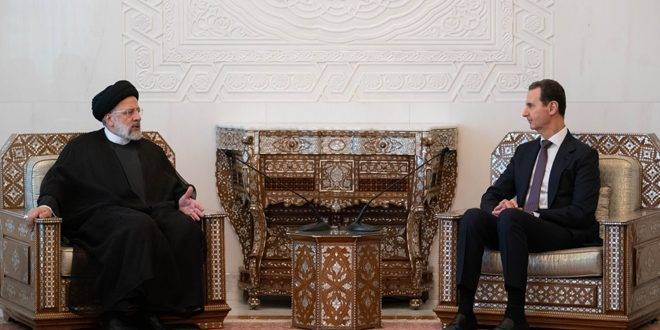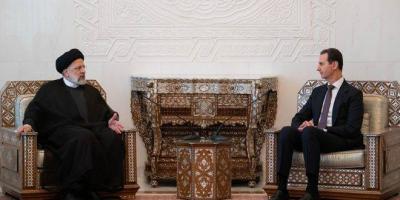During extensive talks with Iranian President Ebrahim Raisi, President Bashar al-Assad emphasized that "Syrian-Iranian relations are rich in content, experiences, and the vision they have built. Because of this, even in difficult times, the relationship remained stable and solid despite the intense political and security storms that have hit the Middle East." Raisi stated, "Syria, both government and people, has overcome great difficulties. Today we can say you have crossed and overcome all these problems, achieving victory despite the threats and sanctions imposed against you."
The two presidents signed a long-term cooperation agreement, including a memorandum of understanding regarding oil cooperation. Assad and Raisi discussed bilateral relations in various fields and ways to develop them, as well as the developments in the Middle East and the reflection of global changes on the region. They also sought to unify efforts to invest these changes for the benefit of both countries and their peoples.
Syrian President Bashar al-Assad welcomed his Iranian counterpart Ebrahim Raisi after a formal reception ceremony took place upon Raisi's arrival at the Presidential Palace in Damascus. The national anthems of the Islamic Republic of Iran and the Syrian Arab Republic were played, followed by a display of the honor guard. The two presidents then greeted members of their official delegations. Raisi arrived at Damascus International Airport on Wednesday, marking the first visit by an Iranian president to Syria since the outbreak of war in the country in 2011, according to Iranian news agency Tasnim. Political and economic discussions are to follow, leading to the signing of agreements.
Iranian and Syrian flags lined the road to the airport in preparation for Raisi and his accompanying delegation, which includes the ministers of oil, defense, foreign affairs, and communications. Syrian state media revealed that the visit would last two days. Raisi’s visit comes as Iran and Saudi Arabia work to rebuild their relations after years of tension. Additionally, Arab countries that isolated Syria due to its crackdown on protesters in 2011 are mapping a way to end the 12-year war and lift Damascus's Arab isolation.
In this context, Raisi welcomed the restoration of the Syrian government's relations with various countries around the world, especially in the region. He stressed that "Tehran adheres to a policy of engaging with neighboring states, aiming to establish good relations with them to enhance cooperation in political, economic, cultural, and social fields." Raisi pointed out in a special interview with "Al-Mayadeen" that "Iran has relationships, connections, and brotherhood with all Islamic countries, which is among its priorities." He regarded Syria as always being at the center of resistance, standing firm against aggressions and enjoying Iran's continuous support.
Raisi stated, "The United States, through the creation of ISIS and inciting discord in Syria, sought to divide the country, sowing much discord and conflicts within." He affirmed that "the United States incited Arab countries against Syria, and these countries also sought to settle scores with Damascus, believing Syria would collapse, and hoped to break the front line of resistance." He continued, “Iran stood firm; it may be the only country that supported Syria and faced all takfiri factions and separatist movements, even some regional countries that sought to divide Syria."
According to the Iranian president, "Conditions today have changed significantly in Syria, and President Bashar al-Assad is deserving of appreciation for standing with the Syrian people." He noted that "on the day Tehran supported Syria, Lebanon, Hezbollah, the Syrian people, and Iran worked together to prevent the division of Syria." Regarding Iran-Syria relations, he confirmed that "these relations will continue," explaining that his visit to Damascus is part of the relationship between the two countries and in support of the resistance front.
Raisi emphasized several points regarding Syria, particularly the "sovereignty of the Syrian government over all Syrian territory and the necessity of the rapid withdrawal of U.S. forces from Syria." He added, "We are ready to cooperate with the Syrian people and government; in Iran, we have skilled technical teams and companies capable of playing a significant role in the reconstruction of Syria."
Iranian Foreign Minister Hossein Amir Abdollahian described the visit as "a success for the government’s diplomacy in completing the regional integration process." Meanwhile, the Deputy Director of the Presidency's Office for Political Affairs, Mohammad Jamshidi, viewed Raisi's visit to Syria as "strategic and historic." He stated, "The documents to be signed between the Iranian and Syrian presidents have an economic dimension.” He viewed the "value of this visit lies in its indication of the strategic victory of the Islamic Republic of Iran in the region."
Notably, Tehran has provided the Assad government with lines of credit and secured lucrative business contracts in sectors such as telecommunications and mining, among others. Concurrently, Iranian military presence in the country has solidified. An Israeli missile strike on Damascus in February killed Iranian military experts. It is believed that Tehran exploited aid flow following a devastating earthquake in February to transfer weapons into Syria. Assad has not publicly acknowledged that Iranian forces fought alongside him during the Syrian civil war, stating that Iran only deploys military advisors on the ground.




